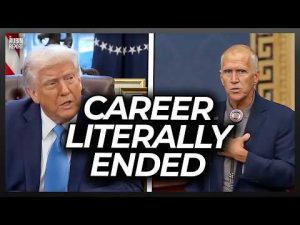**The Curious Case of Judge Tanya Chutkan: Legal Machinations or Political Wizardry?**
Recently, the spotlight has been cast upon Judge Tanya Chutkan, who has been characterized as a “radical cook Obama judge” presiding over the high-profile cases involving Donald Trump. Critics have pointed to her rulings as fundamentally altering the landscape of justice, claiming she has revolutionized the Rules of Evidence in a way that appears to favor the prosecution, particularly special counsel Jack Smith. This has sparked a firestorm of controversy, drawing the attention of legal analysts across the spectrum, including those from outlets typically not known for their conservative leanings.
Scholars and pundits alike have scratched their heads over Chutkan’s decisions, labeling them extraordinary and unlike anything they’ve witnessed in their careers. The defense’s motions appear to have been flipped on their heads, with some suggesting that the government has been granted what amounts to a blank check in its efforts to pursue Trump. In a world where rules dictate the rhythm of legal battles, this has left many asking: is this justice or something more akin to a political spectacle?
Adding fuel to this legal bonfire is the news that Jack Smith, the special counsel at the heart of the investigations into Trump’s alleged attempts to overturn the 2020 election, is planning to step down before the next presidential administration takes office. The timing raises eyebrows, as it suggests a potential unraveling of the cases against Trump. Many conservatives argue that these cases were inherently flawed from the start, trampled by a commitment to politically motivated vengeance rather than genuine justice. After all, if Smith were confident in his work, wouldn’t he want to see it through to the end?
The sentiment echoes the frustrations surrounding these judicial proceedings. With the Department of Justice’s own memos seemingly undermining the foundation for these prosecutions, it seems there are questions of constitutionality lurking in the shadows. Recent judicial decisions—like the one in Florida where a case was dismissed—cast doubt on the legitimacy of these investigations, calling into question whether this was merely a political tug-of-war rather than a pursuit of accountability.
As events unfold, it is crucial to address what this means for American democracy. Challenging elections is hardly a new phenomenon. Throughout history, political candidates from both sides of the aisle have exercised their rights to contest results. Critics of the current investigations argue that criminalizing such behavior flips decades of political norms upside down. Previous challenges by figures like Al Gore or Chuck Schumer didn’t invite the kind of legal repercussions now faced by Trump. The disparity raises eyebrows and speaks to a deeper trend of politicizing judicial authority to silence opposition.
As the dust settles on this convoluted legal theater, many are left wondering what the future holds for American politics. With Judge Chutkan at the helm of such contentious cases and Jack Smith’s departure creating a vacuum, one can’t help but feel that this chapter in history is far from over. If anything, it serves as a stark reminder of the importance of vigilance when it comes to the interplay of law and politics—a reminder that, at least in the world of conservative discourse, the scales of justice can sometimes tilt alarmingly to one side. So, take notes, folks; this is one courtroom drama that will likely keep everyone on their toes well into the foreseeable future.







